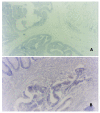Reg gene family and human diseases
- PMID: 14669303
- PMCID: PMC4612022
- DOI: 10.3748/wjg.v9.i12.2635
Reg gene family and human diseases
Abstract
Regenerating gene (Reg or REG) family, within the superfamily of C-type lectin, is mainly involved in the liver, pancreatic, gastric and intestinal cell proliferation or differentiation. Considerable attention has focused on Reg family and its structurally related molecules. Over the last 15 years, 17 members of the Reg family have been cloned and sequenced. They have been considered as members of a conserved protein family sharing structural and some functional properties being involved in injury, inflammation, diabetes and carcinogenesis. We previously identified Reg IV as a strong candidate for a gene that was highly expressed in colorectal adenoma when compared to normal mucosa based on suppression subtractive hybridization (SSH), reverse Northern blot, semi-quantitative reverse transcriptase PCR (RT-PCR) and Northern blot. In situ hybridization results further support that overexpression of Reg IV may be an early event in colorectal carcinogenesis. We suggest that detection of Reg IV overexpression might be useful in the early diagnosis of carcinomatous transformation of adenoma. This review summarizes the roles of Reg family in diseases in the literature as well as our recent results of Reg IV in colorectal cancer. The biological properties of Reg family and its possible roles in human diseases are discussed. We particularly focus on the roles of Reg family as sensitive reactants of tissue injury, prognostic indicators of tumor survival and early biomarkers of carcinogenesis. In addition to our current understanding of Reg gene functions, we postulate that there might be relationships between Reg family and microsatellite instability, apoptosis and cancer with a poor prognosis. Investigation of the correlation between tumor Reg expression and survival rate, and analysis of the Reg gene status in human malignancies, are required to elucidate the biologic consequences of Reg gene expression, the implications for Reg gene regulation of cell growth, tumorigenesis, and the progression of cancer. It needs to be further attested whether Reg gene family is applicable in early detection of cancer and whether Reg and Reg-related molecules can offer novel molecular targets for anticancer therapeutics. This has implications with regard to prognosis, such as in monitoring cancer initiation, progression and recurrence, as well as the design of chemotherapeutic drugs.
Figures


Similar articles
-
Overexpression of Reg IV in colorectal adenoma.Cancer Lett. 2003 Oct 8;200(1):69-76. doi: 10.1016/s0304-3835(03)00460-9. Cancer Lett. 2003. PMID: 14550954
-
Reg IV, a new member of the regenerating gene family, is overexpressed in colorectal carcinomas.Int J Cancer. 2003 Jan 10;103(2):185-93. doi: 10.1002/ijc.10788. Int J Cancer. 2003. PMID: 12455032
-
The role of Reg IV gene and its encoding product in gastric carcinogenesis.Hum Pathol. 2010 Jan;41(1):59-69. doi: 10.1016/j.humpath.2009.06.013. Epub 2009 Sep 8. Hum Pathol. 2010. PMID: 19740514
-
Significance of regenerating islet-derived type IV gene expression in gastroenterological cancers.World J Gastroenterol. 2012 Jul 21;18(27):3502-10. doi: 10.3748/wjg.v18.i27.3502. World J Gastroenterol. 2012. PMID: 22826614 Free PMC article. Review.
-
The Potential Role of REG Family Proteins in Inflammatory and Inflammation-Associated Diseases of the Gastrointestinal Tract.Int J Mol Sci. 2021 Jul 3;22(13):7196. doi: 10.3390/ijms22137196. Int J Mol Sci. 2021. PMID: 34281249 Free PMC article. Review.
Cited by
-
Poly (ADP-ribose) transferase/polymerase-1-deficient mice resistant to age-dependent decrease in β-cell proliferation.Mol Med. 2012 Jul 18;18(1):816-24. doi: 10.2119/molmed.2011.00458. Mol Med. 2012. PMID: 22481269 Free PMC article.
-
Expression of pancreatitis-associated protein after traumatic brain injury: a mechanism potentially contributing to neuroprotection in human brain.Cell Mol Neurobiol. 2011 Nov;31(8):1141-9. doi: 10.1007/s10571-011-9715-0. Epub 2011 Jun 5. Cell Mol Neurobiol. 2011. PMID: 21643999 Free PMC article.
-
Krüppel-like factor 3 inhibition by mutated lncRNA Reg1cp results in human high bone mass syndrome.J Exp Med. 2019 Aug 5;216(8):1944-1964. doi: 10.1084/jem.20181554. Epub 2019 Jun 13. J Exp Med. 2019. PMID: 31196982 Free PMC article.
-
Inflammation and nerve injury induce expression of pancreatitis-associated protein-II in primary sensory neurons.Mol Pain. 2010 Apr 26;6:23. doi: 10.1186/1744-8069-6-23. Mol Pain. 2010. PMID: 20420691 Free PMC article.
-
RegIV expression showing specificity to gastrointestinal tract and its potential role in diagnosing digestive tract neuroendocrine tumor.J Zhejiang Univ Sci B. 2010 Apr;11(4):258-66. doi: 10.1631/jzus.B0900383. J Zhejiang Univ Sci B. 2010. PMID: 20349522 Free PMC article.
References
-
- Hartupee JC, Zhang H, Bonaldo MF, Soares MB, Dieckgraefe BK. Isolation and characterization of a cDNA encoding a novel member of the human regenerating protein family: Reg IV. Biochim Biophys Acta. 2001;1518:287–293. - PubMed
-
- Lasserre C, Simon MT, Ishikawa H, Diriong S, Nguyen VC, Christa L, Vernier P, Brechot C. Structural organization and chromosomal localization of a human gene (HIP/PAP) encoding a C-type lectin overexpressed in primary liver cancer. Eur J Biochem. 1994;224:29–38. - PubMed
-
- Chakraborty C, Katsumata N, Myal Y, Schroedter IC, Brazeau P, Murphy LJ, Shiu RP, Friesen HG. Age-related changes in peptide-23/pancreatitis-associated protein and pancreatic stone protein/reg gene expression in the rat and regulation by growth hormone-releasing hormone. Endocrinology. 1995;136:1843–1849. - PubMed
-
- Katsumata N, Chakraborty C, Myal Y, Schroedter IC, Murphy LJ, Shiu RP, Friesen HG. Molecular cloning and expression of peptide 23, a growth hormone-releasing hormone-inducible pituitary protein. Endocrinology. 1995;136:1332–1339. - PubMed
-
- Broekaert D, Eyckerman S, Lavens D, Verhee A, Waelput W, Vandekerckhove J, Tavernier J. Comparison of leptin- and interleukin-6-regulated expression of the rPAP gene family: evidence for differential co-regulatory signals. Eur Cytokine Netw. 2002;13:78–85. - PubMed
Publication types
MeSH terms
Substances
LinkOut - more resources
Full Text Sources
Other Literature Sources

